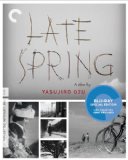| Reviews & Columns |
|
Reviews DVD TV on DVD Blu-ray 4K UHD International DVDs In Theaters Reviews by Studio Video Games Features Collector Series DVDs Easter Egg Database Interviews DVD Talk Radio Feature Articles Columns Anime Talk DVD Savant Horror DVDs The M.O.D. Squad Art House HD Talk Silent DVD
|
DVD Talk Forum |
|
|
| Resources |
|
DVD Price Search Customer Service #'s RCE Info Links |
|
Columns
|
|
|
Late Spring
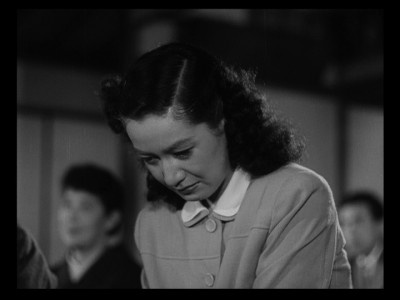
Please Note: The images used here are taken from the 2006 DVD edition, not the Blu-ray edition under review.
In answer to the longstanding cinematic riddle that asks how you can transport your audience into a profound emotional state and move them in a way they've never been moved before, all while steering clear of contrivance, cheap manipulation, or sentimentality, the great Japanese filmmaker Yasujiro Ozu came up with distance, patience, and tact, and he solved it sublimely, creating a unique kind of cinema that has still, in some ways, never been matched. There's something miraculous about the way he achieved, in film after film, through nothing but the most deceptively basic visual means and an allergy to any dramatic overemphasis or blatant stylistic forcefulness, the fullest, most devastating emotional power. He held ever firmer to this unique, counterintuitive, but inimitably effective approach as his style evolved, and it worked brilliantly time and time again over his filmography, to the point that his stands as simply one of the most steadfast and consistent bodies of work in the history of cinema. It can be said, however, that his 1949 film Late Spring, which deals with the slight-sounding, almost banal premise of a widowed father attempting to marry off his grown daughter, is a standout -- the best marker, before Ozu's canonical 1953 achievement Tokyo Story, of the greatness the director was on his way to attaining by boldly paring his aesthetic down further and further, to the most essential, most resonant simplicity.
The film's protagonist is Noriko (Setsuko Hara), a young woman in her late twenties who lives in Kamakura (which was Ozu's own town of residence), an unassuming suburb outside Tokyo, with her widowed father, Professor Somiya. She aids him with his manuscripts; she helps out her Aunt Masa (Haruko Sugimura) with her children; she flirts safely and goes on platonic dates with a young protegé of her father's, Hattori (Jun Usami), who's engaged to another woman and thus represents no threat of a marriage offer, despite his clear desire to cross the bounds of friendship Noriko has firmly set; and she hangs out with her girlfriend Aya (Yumeji Tsukioka), a divorcée working girl. Noriko is utterly content and fulfilled with this life; having not long ago lived through World War II (during which, it's mentioned, she became very ill, only now regaining her health completely; and also during which, one assumes, she lost her mother), she's become unusually close to her father and revels in being his caretaker, keeping him organized and feeling generally useful, needed, and fulfilled. The kind of family life her Aunt Masa has, despite Noriko's glad participation in her young cousin's upbringing, seems to hold little appeal for her; her friend Aya is a cautionary tale about the perils of modern-day marriage; and she's especially withering in her teasing but harsh judgment of a colleague of her father's, a professor who's divorced and now remarried, which she finds "filthy." Noriko, it would seem, is just not the marrying kind.
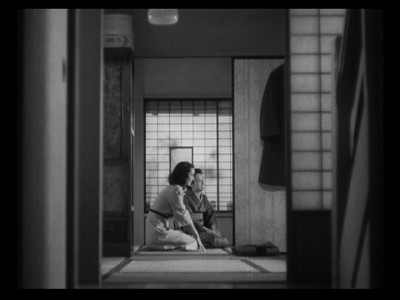
But this state of affairs is unsatisfactory to her aunt and her father, who want Noriko to be happy now that she's finally healthy; after she's missed out on her prime marrying years, they feel the clock is ticking dangerously away on her chances. (The only real happiness they can imagine, in their time, place, and culture, is for Noriko is to find a husband.) A sense of urgency arises when they realize that Hattori, who they'd passively presumed was angling for an engagement to Noriko, is not an option, and Aunt Masa, with her brother's approval, begins the husband-hunt on Noriko's behalf. Noriko's contentment in her life the way it is, though obvious, is not plausible to her older relatives (nor, almost more disappointingly, to her ostensibly liberated, divorce-enlightened friend Aya, who strongly advises marriage as the only path to legitimate adulthood). Masa finds a young man -- a good prospect who, it's said, looks like Gary Cooper -- with whom she'd like to arrange a marriage to Noriko, and her niece grows desperate as things close in on her and it becomes clearer and clearer that this marriage is not just a suggestion or one possible option, but the path she is expected to take for her own good by those who care about her. When her father tells her she must get married -- and, as the clincher, that he is thinking of remarrying, too, so she needn't wait on him anymore -- she is devastated; when she sees him nod across the room at this usurper as he and Noriko take in a Noh play together, the wordless hurt in facial expression and body language that the brilliant Setsuko Hara destroys us with says all that needs to be said about the shame and dismay she's in the grip of now that her father is becoming "filthy" like his cavalierly remarrying colleague, pushing her out into the cold world of adult (i.e., married) life, shattering their blissful haven from such mundane (and, in Noriko's perception, undignified) compromises.
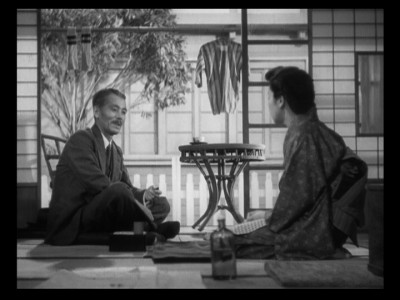
Ozu who co-wrote the screenplay with frequent collaborator Kogo Noda (working from Kazuo Hirotsu's novella Father and Daughter), has his characters speak to one another constantly and affectionately, but much of the emotional punch that Late Spring packs is in precisely what is not said, what we are allowed through Ozu's ingenuity to sense in a way that goes far beyond words or over-demonstrative action. The society being depicted -- postwar Japan -- is not one where blunt, open expressions of one's own wants and needs are approved of, and so there is no acted-out confrontation, nothing comes to a head; life moves inexorably, and the characters move with it. Noriko finally breaks down (which we are aware of without the need for any big, externalized scene of breakdown) and consents to the marriage, as she must; her father, who ultimately had no real intention of getting remarried and was just trying to relieve his daughter of the responsibility she felt, can rest easy knowing that they will never be integral parts of each other's lives again, but that Noriko is "happy." She has allowed him this illusion, swallowing her overpowering wish to remain an immediate part of his life, outwardly accepting the marriage and apologizing for the "selfishness" she had indulged by insisting on remaining single and at home. Mutual generosity, respect, solicitude, and love in the midst of slowly but surely changing mores and traditions have thereby led to a guarantee of one kind of loneliness or another for both Professor Somiya and his daughter, whose relationship has been so symbiotic and central for so long in each of their lives. Their parting is so emotionally predominant on the occasion of Noriko's marriage that we never even see the wedding or the husband she's being married off to.
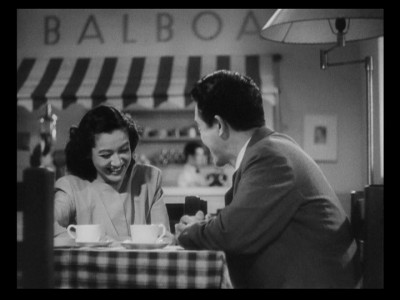
Ordinary rules of drama would surely dictate that a film in which a young lady's marriage is this pivotal would have to give some screen time to the husband and to the wedding, but perhaps Ozu's most radical move here, the biggest step toward the purification of the emotionally true, accepting, humane vision of life he devoted his career to putting onscreen, is that omission; it's simply not part of what the film is really about, which is a loss, an ending to the closeness between Noriko and her father that is being effected by the beginning that her marriage could be said to represent. Ozu's style hasn't yet reached the perfect sort of surface stasis it would achieve later, and there are more cinematic conventions here -- more close-ups and camera movement -- than in his later films. But beyond his narrative rigorousness, the necessary accompanying visual essentialism is beginning to show: his famous "pillow shots" (cuts away to seemingly unrelated, serenely still exteriors, inserted between one dramatic scene and another, of the nature and civilization surrounding his characters) are present in full, memorable force, and there are a great many of the low-angle, unmoving medium interior shots that would come to be his almost exclusive choice of visual representation when it came to his characters' environments.
The purpose of all of Ozu's paring down of plot and carefully constructed placidity of image is to evade any trumped-up rush of "drama" and instead place the people we're seeing and what they're experiencing, all "ordinary" to their core, into a cinematic space whose sole focus and purpose is to facilitate our sincere contemplation of what these unadorned, seemingly undramatized (because not jammed with exposition or dynamic event) experiences mean -- how extraordinary they are when truly felt, which is what Ozu means to allow us to do. The full force of what happens to Noriko and her father in Late Spring is not so much expressed as revealed by Ozu's (and, by extension, our own) carefully calibrated gaze, because he has the patience and astuteness to direct it precisely toward only what his sensibility tells him is significant, holding it long enough to allow the unspoken poignancy to sink into us, to work a sort of emotional hypnosis that lets the gravity and consequentiality of the most everyday human connections -- their sad, unavoidable tenuousness when faced with the passing of time and the constant changing of life -- dawn on us slowly, fully, indelibly. Late Spring is a quiet, still, observant film about people whose fates are in some ways terribly sad, but it's a paradox here, as it is in all of Ozu's best films, that his way of conveying that sadness -- his gentle, tender, but noninterventionalist and accepting way of making his camera see what nobody else's has ever quite been able to, penetrating to something elemental about human feeling, connection, and life -- gladdens our hearts even as it breaks them.
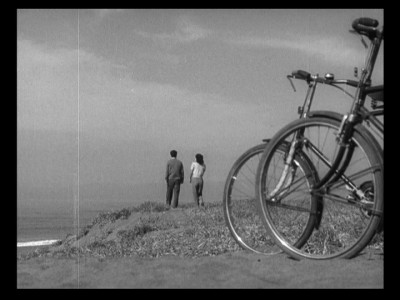
THE BLU-RAY DISC:
The AVC/MPEG-4 encoded, 1080/24p-mastered, 1.33:1 aspect-ratio transfer is quite good, though it seems clear that the same materials have been used as for Criterion's 2006 DVD release. As is the case with many of Ozu's films, the apparent best-preserved and -restored copy of Late Spring is still dotted with scratches, flicker, and other mild but persistent signs of print wear and tear. Still, it seems just as obvious that the finest available sources are being brought to us, and those flaws that couldn't be eliminated do not make us substantially less grateful for the experience; there is no compression artifacting or overenthusiastic digital noise reduction, so although watching this Blu-ray edition of Late Spring is not quite like looking at a newly-struck print, it does retain the feel of watching it on film.
Sound:The same goes for the sound (presented here on an uncompressed PCM 1.0 monaural soundtrack, in Japanese with optional English subtitles) as for the picture; the print is not pristine, and the sound is very mildly distorted or tinny in general, with a couple of brief instances of noticeable background hiss standing out. These flaws are no different than what would be present in a well-traveled print of the film taken in at a revival house (if it's even that imperfect), and they don't significantly distract, nor could they possibly diminish this film's power.
Extras:--Tokyo-ga, a full-length (90 min.) 1985 documentary by Wim Wenders (Paris, Texas; Wings of Desire) that comprises footage of the city from a 1983 visit Wenders took with future I'm Not There/Life During Wartime cinematographer Ed Lachman, and Wenders's voiced-over retrospective musings. Wenders pays thoughtful tribute to Ozu, whose Tokyo he went in search of -- interviewing frequent Ozu player Chishu Ryu and cinematographer Yuharu Atsuta, making Ozu-style shots, and tracking down locations from the master's films, with Wenders's New German Cinema compatriot Werner Herzog popping in to gnomically intone, regarding Tokyo, "There is nothing left here." -- but only partially succeeded in finding. Wenders verbally mulls over footage illustrating some of the things about Japanese culture that a Westerner doesn't readily recognize, and though the film's raison d'être is to pay homage to Ozu, it would also work remarkably well as a double feature with Chris Marker's Sans Soleil, made right around the same early-'80s period and also an engaged, deep-thinking travelogue on a Westerner's encounter with Japan -- Tokyo-ga as complementary diary entry to Marker's more cleverly/rigorously constructed essay.
--The feature-length audio commentary by Columbia film studies professor/ Film Society of Lincoln Center programmer Richard Pena is intuitive and perceptive. Pena aligns himself with, perhaps, the viewer's perspective as someone who can see Ozu's genius and importance but may be hard-pressed to articulate the reasons behind that impression. Both in his scene-by-scene breakdowns and explications and in his overarching approach, Pena humbly, appealingly takes the opportunity of recording a commentary track to enlighten in a friendly, unintimidating way.
--A delicately pretty, 22-page booklet featuring an essay on Late Spring by critic Michael Atkinson; an appreciation of Ozu's long-running collaboration with the film's lead actress, Setsuko Haru; and a very concise, simple, and elegant (what else would one expect?) written appreciation by Ozu on his frequent screenwriting collaborator Kogo Noda.
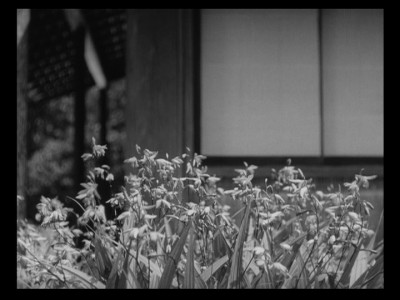
A masterwork that represents a major leap forward in the pared-down, gently heartbreaking style that the superlative Japanese master Yasujiro Ozu would spend the rest of his brilliant career honing for our cinematic edification and pleasure, Late Spring makes the reviewer wish there were a stronger word for "bittersweet." Ozu has an inimitable way of embracing the inevitable, painful change, loss, and separation that occur in the course of any life; in this case, his restrained, calm, patient style takes up and examines the story of a grown daughter, Noriko, whose father and aunt conspire to "help" her by pressuring her to marry before her marriageable years are behind her, despite the fact that she seems genuinely happy and complete as she is, stubbornly single and taking care of her widowed father. The fact that the actions her elders take, which lead to Noriko's resigned exodus from a world of familial coziness, are truly loving, well-meaning, and intended for her happiness, make the film genuinely tragic -- redolent of suffering, without any figure to point to and blame as its villainous cause. But the emotionally adroit Ozu, like an expert motorcyclist taking a sharp curve, leans into his heroine's unsought transition out into the cold world in a way that gives the film an aura of resilience, not defeat, despite its principled avoidance of any anomalous, false-hope happy ending for her. Ozu's apparent detachment (his seemingly neutral, symmetrical framing, measured montage, and camera that, by the time of Late Spring, was drawing ever closer to its famous, permanently immobile state) and the ordinariness of his people, with his focus on their humdrum, everyday, circumscribed routines, have nothing to do with lamenting, let alone looking down on, the near-interchangeable anonymity of his typical middle-class characters; his distance is solemnly respectful and deeply meditative, not cool or clinical.
In Late Spring, as in each of his greatest films, Ozu surveys the vast landscape of family lives like millions of near-identical pebbles on the shore, then selects one and takes all the time and concentration necessary to slowly, methodically examine it, with extraordinary sensitivity, for every contour and edge, every particularity that, however slight its difference from all the other lives going on around it, make all of its joys and sorrows profoundly, urgently its own. The film is quietly, almost unbearably sad, its heroine's clinging to the way things feel right for her ultimately futile. But exposing oneself through them to Ozu's exquisitely calm, deep feeling for his fellow human beings is just exhilarating, on both the aesthetic and philosophical levels: his singular way of acknowledging and accepting the transience of relationships and traditions (and, implicitly, of life itself) is so beautiful, serene, and pure that it paradoxically leaves you feeling not heavyhearted, but refreshed, light -- somehow cleansed, relaxed, and relieved, as if Ozu had offered to share, at least for Late Spring's two precious hours, the burden of passing time and impermanence that we all must shoulder. Highly Recommended.
|
| Popular Reviews |
| Sponsored Links |
|
|
| Sponsored Links |
|
|
| Release List | Reviews | Shop | Newsletter | Forum | DVD Giveaways | Blu-Ray | Advertise |
|
Copyright 2024 DVDTalk.com All Rights Reserved. Legal Info, Privacy Policy, Terms of Use,
Manage Preferences,
Your Privacy Choices | |||||||









